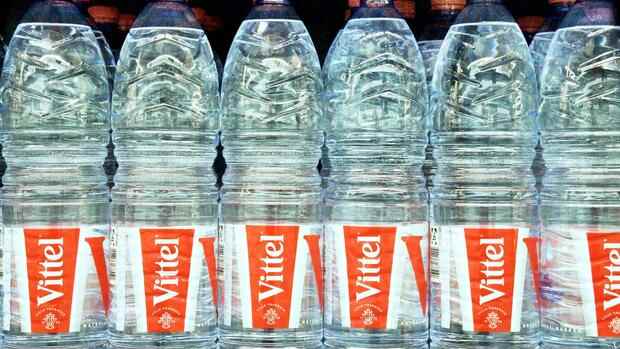As of November, Nestlé will no longer supply the German discounter Lidl with Vittel mineral water.
(Photo: picture alliance / Rolf Haid)
Dusseldorf The customers of the discounter Lidl will soon look in vain for water from the Vittel brand. Nestlé Waters will stop delivering from November. “The existing Vittel contract between Nestlé Waters Germany and Lidl Germany expires at the end of October 2021. After a joint vote, it was decided not to extend the existing contract with Vittel, ”said Nestlé when asked. The group did not give any reasons. The “Manager Magazin” reported first.
Lidl is the most important buyer of Vittel mineral water in this country. The fact that supplies to the discounter are now running out marks a further step in Nestlé’s withdrawal from the water business. The group left it open as to how things will continue with other Vittel trading partners in this country. Nestlé does not want to comment on the status of the annual negotiations.
The water business of the world’s largest consumer goods manufacturer has been criticized by environmentalists for years: on the one hand because of the intensive use of the springs, on the other hand because of the plastic waste caused by non-returnable PET bottles. In 2019, the German Environmental Aid (DUH) awarded Vittel the negative “Golden Vulture” award. “The Vittel one-way plastic bottles are harmful to the environment because they have to be manufactured anew for each filling process, which uses a lot of energy and resources”, so the criticism.
The fact that Vittel switched most of the bottle sizes in this country to 100 percent recycled material could not stop the falling popularity of PET bottles. The DUH also complains that Vittel water from France is transported over long distances to Germany, although there are more than 100 mineral wells in the region in this country.
Top jobs of the day
Find the best jobs now and
be notified by email.
Crane water competes with mineral water
The water comes from the place Vittel in the Vosges. The water table there has been sinking for years, which is why Nestlé has reduced the amount of water withdrawn. The group takes around a quarter of the groundwater extracted in Vittel. After severe criticism, plans to supply the residents with water by pipeline were canceled again. Nestlé has started to clean up wild local garbage dumps with Vittel plastic bottles.
The much-criticized group is withdrawing more and more from the global water business. In any case, the division is the group’s weakest margin. In the first half of the year, the operating profit margin was 8.9 percent, and 17.4 percent for the entire group. Recently, water only contributed five percent to sales.
In 2020, the Swiss had already sold their water business in China. In late March 2021, they sold their regional spring water brands, purified bottled water business, and beverage delivery services in North America for $ 4.3 billion. At the same time, Nestlé took over Essentia Water, a US premium brand for functional water products.
The acquisition is part of the new strategy. “Nestlé is realigning the global water business and increasing the focus on international premium and mineral water brands as well as on products for healthy fluid intake,” write the Swiss. This also includes entering the soda maker business with Refill plus. Tap water is becoming increasingly popular.
There has been a rumble in Nestlé’s German water division for a long time. Country manager Marc Hunold and commercial manager Ingo Swoboda only gave up their posts in June. Attempts to offer Vittel in reusable glass containers in the retail trade in view of the plastic bashing have been given up again, according to the industry service “Inside Beverage”. The reusable PET crate also disappeared from the market.
Nestlé’s water division is drying up more and more in this country. At the turn of the millennium, it was still the leader in terms of sales – at least for branded waters. In 2020, Nestlé Waters was only ranked eleventh among German mineral springs in terms of sales. Soft drinks were also recorded. Sales fell by 4.6 percent to 403 million liters, estimates the industry service “Beverage Info”. The largest German mineral fountain is now Lidl’s mother, Schwarz.
More: Nestlé boss Mark Schneider relies entirely on healthy nutrition – but the group is growing with coffee and ice cream
